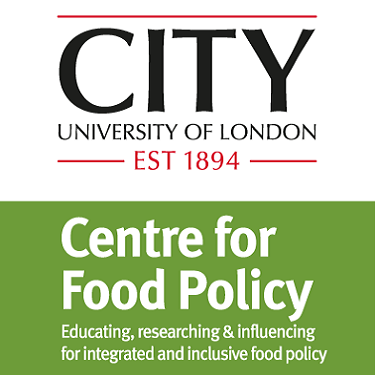Welcome to the first dispatch from the Centre for Food Policy. It’s been a year since I took over the Centre. In that time, I’ve been doing a lot of reflecting about what this Centre is about and what it can now bring to the burgeoning field of food systems thinking and practice.
Since the Centre was established — back in 1994 — there have been enormous developments in the world of food policy. Back then, the term “food system” was still an evolving concept. Now, in the world of food, agriculture, nutrition, environmental science, rural sociology, and even economics, the term has become de rigueur. The Food and Agricultural Organization of the United Nations (FAO) talks “food systems” not just “agriculture”. The Wellcome Trust, long-focused on funding biomedical research, has taken up the cause with its new Our Planet Our Health initiative. Meanwhile, the World Bank is publishing reports about food systems. This is a long way from when food systems were seen as a vaguely hippie-ish, fringe concern.
My predecessors at the Centre for Food Policy played a role in advancing this food systems thinking. Unless we recognise the connections in the food system, they said, we’re never really going to resolve food systems problems. This thinking is what lies behind my colleague Tim Lang’s new book on Sustainable Diets. In it, he, and Masters in Food Policy alumni, Pamela Mason, discuss the perils and possibilities of bringing together environmental and health concerns in food. We’ll be debating their book in a new start to our Food Thinkers Seminar Series on 24th May. Please do come along – register here, and for more on food systems thinking, check out our teaching initiative, Innovative Food Systems Teaching and Learning.
Going forward, one of the Centre’s priorities will be to further explore this integrated approach by asking how: how can local, national and international governments and other stakeholders advance a more integrated, coherent approach to food policies? Our work at the Food Research Collaboration is already engaging with this agenda, providing insights into how food policy and governance might become more coherent in a post-Brexit Britain. It’s something I work on through co-chairing the Global Nutrition Report where we bring together different forms of malnutrition, advocating an approach in which undernutrition and unhealthy diets are placed in the same frame. Integration does not mean solving everything at once, but leveraging connections to find solutions.
A second priority will be to advance a clearer understanding of how food policy design and delivery can do a better job of engaging people. We spoke about this “people-centred approach” at our 2016 City Food Symposium, trying to practice what we were preaching, getting lots of different people involved, hearing their voices. My colleague Martin Caraher has been working in this way for years through his work on food insecurity — listening to the voices of people who experience the problem. It’s a topic he spoke about at his recent Tedx Talk.
When I lived in Brazil and studied their food policies I learned something that’s stayed with me to this day: applying, testing, and then reflecting, learning and changing, is fundamental to successful food policy. That’s what these dispatches will be about: sharing what we learn about how food policy can work better by being more integrated and more inclusive.
My second dispatch will be what I have learned from the upcoming 2017 Oxford Food Forum (April 29th), a topic close to our hearts: Building Linkages in the Food System and you can keep up to date with us @CorinnaHawkes and @FoodPolicyCity .


Leave a Reply